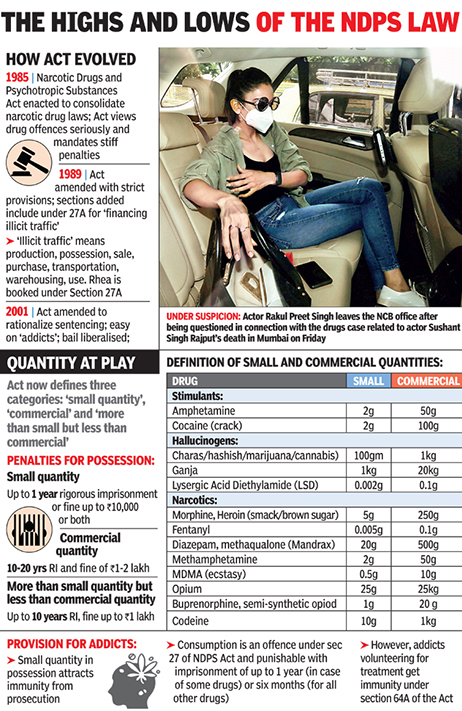Governance
NDPS (Amendment) Bill, 2021
- 08 Dec 2021
- 7 min read
Why in News
Recently, the NDPS (Amendment) Bill, 2021 was introduced in the Lok Sabha.
- The bill will amend the Narcotic Drugs and Psychotropic Substances Act, 1985.
Narcotic Drugs and Psychotropic Substances Act, 1985
- The Act regulates certain operations - such as manufacture, transport and consumption - related to narcotic drugs and psychotropic substances.
- Under the Act, financing certain illicit activities such as cultivating cannabis, manufacturing narcotic drugs or harbouring persons engaged in them is an offence.
- Persons found guilty of this offence will be punished with rigorous imprisonment of at least 10 years - extendable up to 20 years - and a fine of at least Rs.1 lakh.
- It also provides for forfeiture of property derived from, or used in, illicit traffic in narcotic drugs and psychotropic substances.
- It also provides for death penalty in some cases where a person is a repeat offender.
- The Narcotics Control Bureau was also constituted in 1986 under the Act.
Key Points
- About the Bill:
- The bill would replace an ordinance promulgated earlier this year (2021) to correct a drafting error in a 2014 amendment to the Act.
- Before the 2014 amendment, clause (viii-a) of Section 2 contained sub-clauses (i) to (v), which defined the term “illicit traffic”.
- In 2014, the Act was amended and the clause number of the definition for such illicit activities was changed.
- However, the section (27A) on penalty for financing these illicit activities was not amended and continued to refer to the earlier clause number of the definition.
- The ordinance amended the section on penalty to change the reference to the new clause number.
- In a recent judgment, Tripura High Court has held that ‘until the appropriate legislative change occurs by amending Section 27A of the NDPS Act appropriately, sub-clauses (i) to (v) of clause (viii-a) of Section 2 of the NDPS Act shall suffer effect of deletion.
- The bill would replace an ordinance promulgated earlier this year (2021) to correct a drafting error in a 2014 amendment to the Act.
Section 27A of the NDPS Act
- The provision reads that whoever indulges in financing, directly or indirectly, any of the activities specified in sub-clauses (i) to (v) of clause (viiia) of section 2 or harbours any person engaged in any of the aforementioned activities.
- He shall be punishable with rigorous imprisonment for a term which shall not be less than ten years but which may extend to twenty years and shall also be liable to fine which shall not be less than one lakh rupees but which may extend to two lakh rupees:
- Provided that the court may, for reasons to be recorded in the judgment, impose a fine exceeding two lakh rupees.
Reason of Section 27A getting Inoperable
- The text of the provision says that offences mentioned under Section 2 (viiia) sub-clauses i-v are punishable through Section 27A.
- However, Section 2 (viiia) sub-clauses i-v, which is supposed to be the catalog of offences, does not exist after the 2014 amendment.
- So, if Section 27A penalises a blank list or a non-existent provision, it can be argued that it is virtually inoperable.
- Objective of the Bill:
- To help victims of drug abuse to come out of addiction.
- To Decriminalise possession of a limited quantity of drugs for personal use while regulating certain operations such as manufacturing, transport and consumption of narcotic drugs and psychotropic substances.
- Concerns Related to the Bill:
- The new provision is giving retrosp ective effect from 1st May 2014.
- That means a criminal provision is given, which will not hold in good law.
- It also violates the fundamental rights in Article 20 because a person can be punished for an offence for which there is a law in existence at the time of commission of the offence.
- The new provision is giving retrosp ective effect from 1st May 2014.
Initiatives to Tackle Drug Addiction
- Narco-Coordination Centre: The Narco-Coordination Centre (NCORD) was constituted in 2016 and the scheme of “Financial Assistance to States for Narcotics Control” was revived.
- Seizure Information Management System: Narcotics Control Bureau has been provided funds for developing a new software i.e. Seizure Information Management System (SIMS) which will create a complete online database of drug offences and offenders.
- National Drug Abuse Survey: The government is also conducting a National Drug Abuse Survey to measure trends of drug abuse in India through the Ministry of Social Justice & Empowerment with the help of National Drug Dependence Treatment Centre of AIIMS.
- Project Sunrise: It was launched by the Ministry of Health and Family Welfare in 2016, to tackle the rising HIV prevalence in north-eastern states in India, especially among people injecting drugs.
- NDPS Act: It prohibits a person from producing, possessing, selling, purchasing, transporting, storing, and/or consuming any narcotic drug or psychotropic substance.
- The NDPS Act has since been amended thrice – in 1988, 2001 and 2014.
- The Act extends to the whole of India and it applies also to all Indian citizens outside India and to all persons on ships and aircraft registered in India.
- Nasha Mukt Bharat: Government has also announced the launch of the ‘Nasha Mukt Bharat’, or Drug-Free India Campaign which focuses on community outreach programs.





